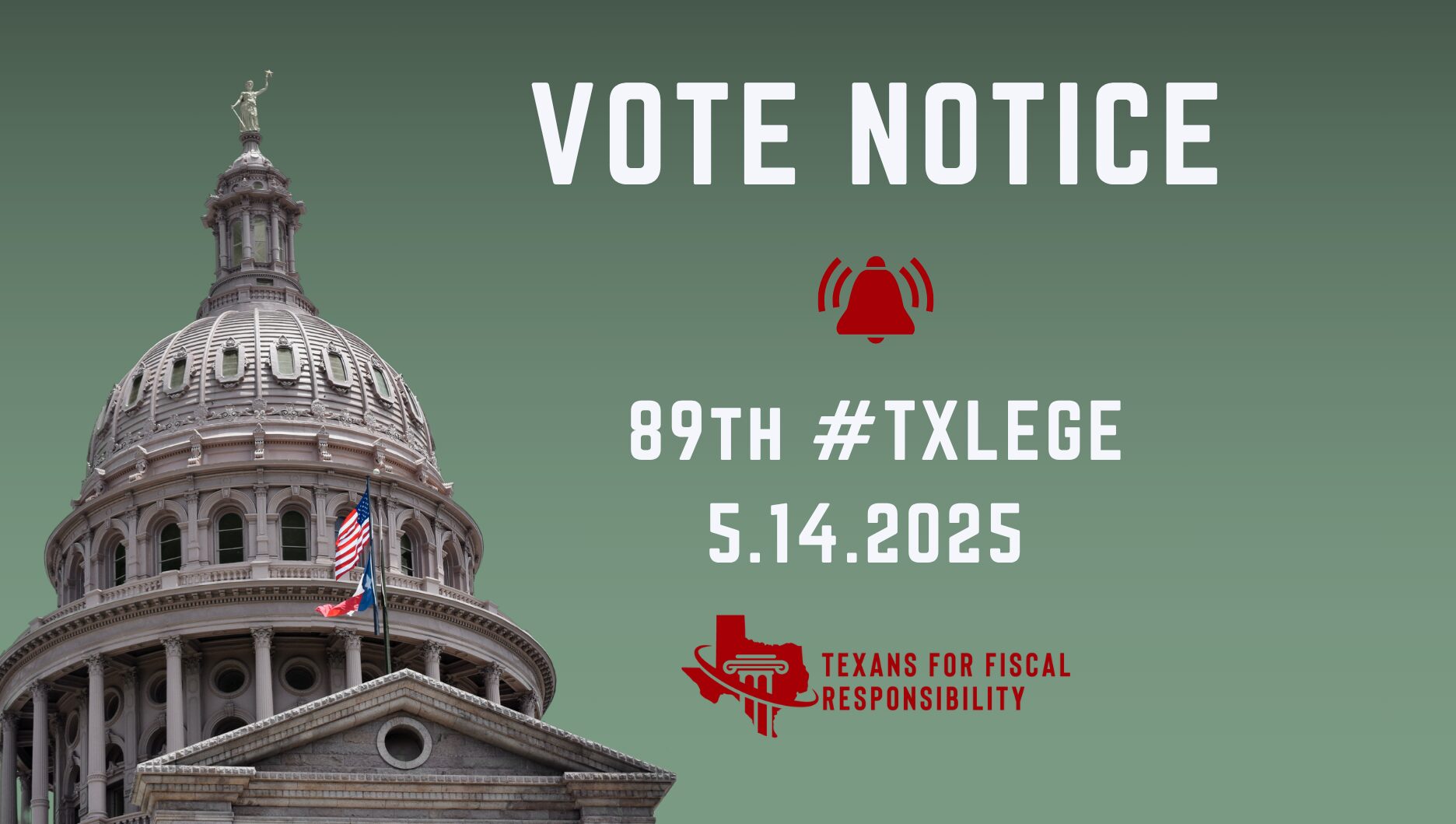
Texans for Fiscal Responsibility has issued the following vote notice for May 14th, 2025
Texas House of Representatives
Subject: House Joint Resolution 73 (HJR 73) – Expanded tax relief for elderly or disabled
- Author: State Rep. Terry Wilson (R-Georgetown)
- Caption: Proposing a constitutional amendment to authorize a limitation on the total amount of ad valorem taxes that a political subdivision other than a school district, county, municipality, or junior college district may impose on the residence homesteads of certain low-income persons who are disabled or elderly and their surviving spouses.
- TFR Position: SUPPORT
- Background:
- HJR 73 allows more local taxing entities to offer property tax relief to elderly and disabled Texans living on fixed, limited incomes. By extending tax freeze authority beyond just counties and cities to include entities like MUDs and hospital districts, it ensures vulnerable homeowners aren’t priced out of their homes due to ever-increasing tax burdens. It protects surviving spouses and provides stability for long-term residents. Furthermore, it maintains taxpayer accountability by preventing local officials from later undoing the protection once adopted.
Subject: House Bill 982 (HB 982) – Expanded tax relief for elderly or disabled
- Author: State Rep. Terry Wilson (R-Georgetown)
- Caption: Relating to the authority of a taxing unit other than a school district, county, municipality, or junior college district to establish a limitation on the amount of ad valorem taxes that the taxing unit may impose on the residence homesteads of certain low-income individuals who are disabled or elderly and their surviving spouses.
- TFR Position: SUPPORT
- Background:
- HB 982 is the enabling legislation for HJR 73. It allows more local taxing entities to offer property tax relief to elderly and disabled Texans living on fixed, limited incomes. By extending tax freeze authority beyond just counties and cities to include entities like MUDs and hospital districts, it ensures vulnerable homeowners aren’t priced out of their homes due to ever-increasing tax burdens. It protects surviving spouses and provides stability for long-term residents. Furthermore, it maintains taxpayer accountability by preventing local officials from later undoing the protection once adopted.
Subject: House Bill 3424 (HB 3424) – Streamlines equipment tax process
- Author: State Rep. Giovanni Capriglione (R-Southlake)
- Caption: Relating to the ad valorem taxation of certain dealer’s heavy equipment inventory.
- TFR Position: SUPPORT
- Background:
- HB 3424 streamlines the property tax process for businesses that rent or sell heavy equipment by replacing outdated monthly filing requirements with a more manageable quarterly schedule. It simplifies the paperwork dealers must complete and removes duplicative reporting to local officials. By allowing businesses to report aggregate totals rather than itemized transactions, the bill reduces red tape and lowers compliance costs. The bill also improves tax transparency by requiring tax collectors to send annual notices about tax calculation factors, helping businesses plan ahead. Additionally, it provides flexibility for new business owners who take over equipment inventories to continue using the same tax rates when assuming tax responsibility. This legislation helps modernize outdated tax practices and shifts regulatory burdens away from small businesses.
Subject: House Bill 3383 (HB 3383) – Local Government Water Planning
- Author: State Rep. Terry Canales (D-Edinburg)
- Caption: Relating to the authority of a local government to enter into an interlocal contract with certain governmental entities to participate in water research or planning activities.
- TFR Position: SUPPORT
- Background:
- HB 3383 promotes fiscal responsibility by allowing local governments to collaborate on water research and planning, reducing redundant spending and maximizing taxpayer dollars. By enabling regional partnerships, it eliminates inefficiencies ensuring that infrastructure and resource management projects are cost-effective.
Subject: House Bill 3159 (HB 3159) – Incentivizes oil well restimulation
- Author: State Rep. Drew Darby (R-San Angelo)
- Caption: Relating to a severance tax exemption for oil and gas produced from certain previously inactive restimulation wells; providing a civil penalty.
- TFR Position: SUPPORT
- Background:
- HB 3159 encourages efficient resource use by offering a targeted severance tax exemption for oil and gas companies that reinvest in inactive wells through restimulation. This approach supports energy production without subsidizing new drilling or infrastructure, making better use of what already exists. The bill’s time-limited and capped tax relief ensures that incentives are measured and don’t create permanent loopholes or runaway costs. By requiring verification through the Railroad Commission and the Comptroller, the bill safeguards against abuse and fraud. Only wells with a history of substantial production qualify, which prevents speculative or unproductive ventures from exploiting the tax break. The bill avoids expanding government bureaucracy and limits the scope of benefit to previously dormant assets, not new projects. Overall, this policy aligns with limited-government principles by encouraging private capital to revive existing resources without growing state obligations.
Subject: House Bill 4359 (HB 4359) – Audit School District Spending
- Author: State Rep. Giovanni Capriglione (R-Southlake)
- Caption: Relating to the review of school districts by the Sunset Advisory Commission.
- TFR Position: SUPPORT
- Background:
- HB 4359 introduces routine forensic audits of public school districts to ensure taxpayer dollars are being used wisely. The bill empowers the Sunset Advisory Commission to investigate two districts per cycle—one that spends the least and one that spends the most on instruction per student. This balanced approach helps identify both poor financial practices and models of efficiency. Reports from these audits will shine a light on where money is being wasted, especially in bloated administrative budgets, and offer guidance on improving operations. Though the bill requires modest state costs to staff the reviews, these audits have the potential to uncover far greater inefficiencies and redirect funds toward actual classroom needs. This measure equips lawmakers, taxpayers, and local officials with data-driven insights to curb waste, fraud and abuse.
Subject: House Bill 3567 (HB 3567) – HOT tax expansion
- Author: State Rep. James Frank (R-Wichita Falls)
- Caption: Relating to authorizing certain counties to impose a hotel occupancy tax.
- TFR Position: OPPOSE
- Background:
- HB 3567 would allow Wichita County to impose an additional tax on hotel stays, creating a new local revenue stream under the hotel occupancy tax. Even though the substitute version removed broad discretionary spending language, the tax still opens the door for local governments to grow by increasing their budgets through new levies. This adds to the overall tax burden, which can discourage business investment and reduce affordability for travelers and families. From a fiscally conservative perspective, counties should prioritize spending reforms and existing resources rather than seek new taxes.
Subject: House Bill 4683 (HB 4683) – HOT tax subsidy
- Author: State Rep. Jeff Leach (R-Allen)
- Caption: Relating to the authority of certain municipalities to use certain tax revenue for hotel and convention center projects.
- TFR Position: OPPOSE
- Background:
- HB 4683 allows the City of Anna to claim state hotel and sales tax revenue to fund a new hotel and convention center project. The city would collect these state funds for ten years, diverting them from the state’s general revenue. Although pitched as an economic development tool, this is another example of selective government subsidy—picking winners by allowing one city to redirect state tax dollars for a local development project. It expands a growing list of carve-outs in state law that funnel taxpayer funds into hotel developments rather than statewide priorities like tax relief or infrastructure. Projects like this should stand on their own financial merit, not at the expense of taxpayers. The state is projected to lose over $1 million in just the first two years of implementation.
Subject: House Bill 3715 (HB 3715) – HOT tax subsidy
- Author: State Rep. R.D. Guerra (D-Mission)
- Caption: Relating to the authority of certain municipalities to use certain tax revenue for hotel and convention center projects.
- TFR Position: OPPOSE
- Background:
- HB 3715 allows the City of McAllen to capture Hotel tax revenues for its own use in funding a hotel and convention center project. By diverting state hotel and sales tax revenues away from general revenue, the bill essentially provides a special tax subsidy to one local government. It’s structured narrowly to benefit a single city, creating yet another carve-out in an already bloated list of cities receiving state-backed handouts for local development. From a fiscally conservative perspective, this undermines fair competition, encourages government-favored development, and picks winners using taxpayer funds. Projects like this should prove their worth in the private market, not rely on targeted tax privileges handed out through the legislature.
Subject: House Bill 1998 (HB 1998) – Weakens local procurement oversight
- Author: State Rep. David Spiller (R-Jacksboro)
- Caption: Relating to the amount of an expenditure made by certain political subdivisions for which a competitive procurement method may be required.
- TFR Position: OPPOSE
- Background:
- HB 1998 raises the threshold at which local governments must solicit competitive bids for contracts from $50,000 to $100,000. It applies to cities, counties, school districts, and other subdivisions, allowing them to make larger purchases without public bidding. While proponents argue it will save time and cut red tape, this change weakens an important taxpayer safeguard. Competitive bidding requirements exist to ensure transparency, prevent favoritism, and get the best value for public dollars. Doubling the threshold invites more backroom deals and less oversight, creating room for abuse or waste. It effectively removes competitive pressure for mid-sized contracts—potentially leading to inflated costs or favoritism. Instead of reducing bureaucracy, this bill reduces accountability.
Texas Senate
Subject: House Bill 21 (HB 21) – HFC Reform
- Author: State Rep. Gary Gates (R-Richmond)
- Caption: Relating to housing finance corporations; authorizing a fee.
- TFR Position: SUPPORT
- Background:
- HB 21 reforms how Housing Finance Corporations (HFCs) operate and receive property tax exemptions. It reins in their authority by confining them to their sponsoring city or county, preventing developers from exploiting HFCs to dodge taxes statewide. To be eligible for tax breaks, developments must reserve a set portion of units for lower- and moderate-income tenants and demonstrate substantial rent discounts compared to market rates. The bill ensures taxpayer dollars are not subsidizing projects that provide little public benefit by requiring rigorous affordability, transparency, and accountability standards. It also mandates annual audits of qualifying developments, which must be publicly disclosed and reviewed by the state. If a project fails to meet these standards or does not submit an audit, it risks losing its tax-exempt status. This helps prevent abuse and ensures HFCs are delivering on their promise to support truly affordable housing. Overall, the bill aligns with fiscal conservative values by curbing taxpayer-funded perks for private developers and promoting oversight and efficiency in local housing programs.
Subject: House Bill 3526 (HB 3526) – Local bond transparency
- Author: State Rep. Giovanni Capriglione (R-Southlake)
- Caption: Relating to fiscal transparency for bonds issued by local governmental entities.
- TFR Position: SUPPORT
- Background:
- HB 3526 strengthens financial transparency around local government bond debt. It requires local entities to disclose key information about proposed and issued bonds—including costs and voter approval data—through an easy-to-access online database run by the Bond Review Board. Taxpayers will be able to see, in plain terms, how much debt is being taken on, what it will cost over time, and whether it requires higher taxes. By tracking both issued and unissued bonds and requiring reports on repayments and tax rate impacts, the bill provides a clear picture of local debt burdens. This empowers voters with the facts they need before authorizing new debt and curbs the tendency for local governments to hide the long-term costs of borrowing. It’s a limited-government solution that shines light on local borrowing practices, helping to protect taxpayers from hidden liabilities.
Subject: Senate Bill 1705 (SB 1705) – Cryptocurrency kiosk regulations
- Author: State Sen. Tan Parker (R-Flower Mound)
- Caption: Relating to the regulation of virtual currency kiosks; providing an administrative penalty.
- TFR Position: OPPOSE
- Background:
- SB 1705 creates a sweeping new regulatory regime over virtual currency kiosks in Texas. It requires operators to register with the state, obtain prior approval, and submit detailed reports about kiosk locations and activities. The bill empowers government agencies to access some user data without a warrant and places a host of mandates on operators, including compliance staffing, ID verification, and first-time transaction delays. It caps daily transaction amounts and limits fees, inserting government into pricing decisions better left to the free market. Small operators would face significant costs just to stay in business, favoring larger corporations that can afford complex compliance. The bill also authorizes harsh penalties, emergency shutdowns, and broad enforcement powers, creating a chilling effect on innovation. While well intentioned as a consumer protection bill, it empowers state agencies to micromanage a rapidly evolving sector, consumers lose privacy and face paternalistic restrictions on how they use their money, and legitimate businesses face restrictions and regulations that go too far.
Subject: Senate Bill 2215 (SB 2215) – Property Rights
- Author: State Sen. Donna Campbell (R-New Braunfels)
- Caption: Relating to the enforcement against violations by a municipality of certain zoning laws.
- TFR Position: SUPPORT
- Background:
- SB 2215 gives property owners more power to fight back when cities break zoning laws. It allows landowners to take cities to court directly and seek legal remedies like injunctions or declaratory judgments. If the landowner wins, the court can make the city pay legal fees, discouraging misuse of public funds to defend illegal actions. The bill protects property rights, promotes legal clarity, and ensures government accountability. It curbs unnecessary litigation delays and limits taxpayer exposure to prolonged city-driven legal fights.
Subject: Senate Bill 2309 (SB 2309) – Election Transparency
- Author: State Sen. Bryan Hughes (R-Mineola)
- Caption: Relating to election integrity and security of ballot boxes, including by preventing fraud in the conduct of elections in this state; authorizing a penalty.
- TFR Position: SUPPORT
- Background:
- SB 2309 strengthens election integrity by increasing transparency and accountability in how ballots are handled and stored. The bill ensures that poll watchers can observe the full chain of custody, from the opening of voting machines to the secure transfer of materials. It also mandates video surveillance in high-population counties to deter tampering or mismanagement. These measures are made publicly accessible through livestreams, giving citizens a window into the election process. Penalties for mishandling ballots reinforce the seriousness of election security. The bill also enhances oversight during partial recounts, enabling candidates and their representatives to monitor each step. From a fiscal conservative lens, it promotes transparency without growing government or adding unnecessary spending.
Subject: Senate Bill 2639 (SB 2639) – Property rights and historic designations
- Author: State Sen. Paul Bettencourt (R-Houston)
- Caption: Relating to the designation of a property as a historic landmark and the inclusion of a property in a historic district or similar preservation district by certain municipalities.
- TFR Position: SUPPORT
- Background:
- SB 2639 stops large cities from forcing historic designations onto private properties without either the owner’s consent or financial compensation. It ensures that property owners are not left bearing the cost of government-imposed restrictions that devalue their land or prevent development. If a city wants to impose a historic label against an owner’s wishes, it must offer fair compensation based on the property’s value and restoration costs. If the owner disagrees with the offer, a court process is triggered where independent commissioners assess damages. The city must pay legal and court fees if it undervalued the property. This protects property owners rights and from activist-driven interference that can stall or halt development. It injects transparency and fairness into a process that could be used as a political tool.
Reminder: Vote Notices are provided to both Texas state lawmakers and the general public, sharing Texans for Fiscal Responsibility’s position on issues eligible to be rated as a part of the Fiscal Responsibility Index. Notices are provided prior to votes being taken in each legislative chamber.
Disclaimer: We reserve the right to consider amendments to legislation that may be introduced without notice as a part of issues to be rated on the Fiscal Responsibility Index. We will make every effort to provide notice on amendments that are pre-filed.




